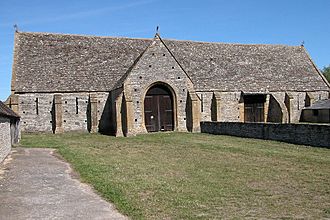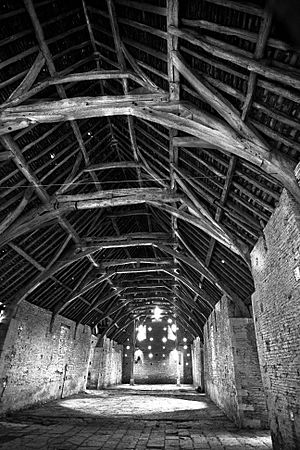Middle Littleton Tythe Barn facts for kids
Quick facts for kids Middle Littleton Tithe Barn |
|
|---|---|
 |
|
| General information | |
| Type | Tithe Barn |
| Address | Middle Littleton, Evesham, Worcestershire |
| Country | England |
| Coordinates | 52°07′19″N 1°53′05″W / 52.12185°N 1.88473°W |
| Construction started | 12th or 13th century |
| Owner | National Trust |
| Height | 40 feet (12 m) |
| Dimensions | |
| Other dimensions | 130 feet (40 m) long, 42 feet (13 m) wide |
| Designations | Grade I listed |
The Middle Littleton Tithe Barn is a very old and important building located in the village of Middle Littleton, near Evesham in Worcestershire, England. It's a special kind of barn called a tithe barn. Long ago, people gave a "tithe" (like a tax, usually crops or goods) to the church or a monastery. This barn was built to store those tithes.
It was built a very long time ago, either in the 13th or 14th century. This makes it one of the largest and most famous tithe barns in all of England! The barn is made from a mix of different stones, including Blue Lias and Cotswold stones, and has a roof made of stone tiles. It was originally built for Evesham Abbey, which was one of the biggest abbeys in England. Today, the barn is owned and looked after by the National Trust.
Contents
The Barn's Story: How Old Is It?
There's a bit of a mystery about exactly when the Middle Littleton Tithe Barn was built. The National Trust believes it was built in the 13th century. However, another group, English Heritage, thinks it's from the 14th century.
This difference in dates comes from different clues. Some scientific tests, like radiocarbon dating, suggest it's from around 1250. But other historical records seem to show that a person named Abbot John Ombersley of Evesham Abbey built it in 1376. Either way, it's definitely a very ancient building!
Why Was It Built?
The barn was built to hold all the tithes collected for Evesham Abbey. An abbey is a large monastery where monks or nuns live and work. Evesham Abbey was the third largest abbey in England before a big event called the Dissolution of the Monasteries. This was when many monasteries in England were closed down.
The huge size of the Middle Littleton Tithe Barn shows just how important and wealthy Evesham Abbey was back then. Even today, you can still see other parts of the old Benedictine Evesham Abbey, like two churches, a bell tower, and the Almonry.
Building Style: What It Looks Like
The barn is built using Blue Lias stone, with special Cotswold stones used for decorative parts. Its roof has a special structure called a triple purlin roof, and it's covered with heavy stone tiles.
Over the years, the building has been changed a few times. For example, during the Victorian period (a long time ago, in the 1800s), some parts of the roof called gables were removed. Other parts were added to the sides. You can still see smaller gables with fancy clover-leaf decorations called finials. The barn also has many strong supports called buttresses that help hold up its walls.
Keeping It Safe: Protected Status
The Middle Littleton Tithe Barn is a very important historical building. Because of its age and unique features, it was given a special status called Grade I listed on July 30, 1959. This means it's considered a building of exceptional interest and is protected by law to make sure it stays safe for future generations.
Visiting the Barn
Today, the barn is owned by the National Trust, a charity that looks after many historic places in England. They keep the barn open so that people can visit and learn about its history. It's a great place to imagine what life was like hundreds of years ago!
 | Percy Lavon Julian |
 | Katherine Johnson |
 | George Washington Carver |
 | Annie Easley |


